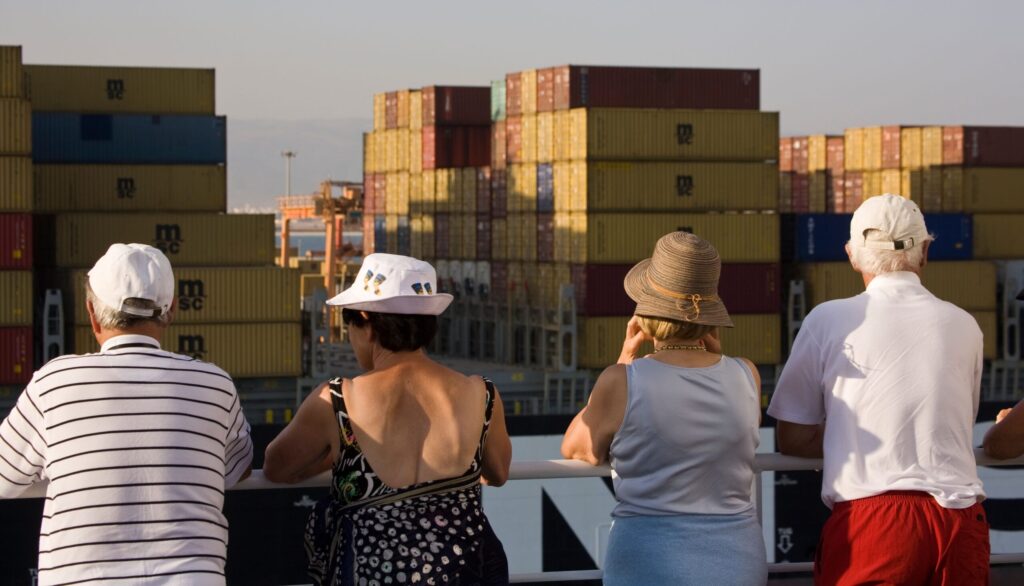Donald Trump’s sweeping new tariffs have jolted the global economy – disrupting trade and sparking widespread alarm.
The US president’s plans to redesign the global trading system will have far-reaching consequences for the Gulf states, most of which rely heavily on international flows of goods through their ports and airports.
Trump’s ambitious trade agenda, which upends a post-war system championed by past US governments, has already prompted howls of protest from America’s trade partners and global businesses.
The president believes US jobs and know-how have been recklessly offshored to countries which have subsequently exploited its consumers and taxpayers. At the same time, his country has become dependent on strategic adversaries, most significantly China, for raw materials and critical goods.
Trump hopes that the imposition of tariffs will bring manufacturing back to the US, increase jobs and create supply chain resilience. He sees his plan as “a declaration of economic independence” and “one of the most important days in American history”.
Imports to the US from Saudi Arabia and the UAE will attract only the ‘base rate’ of 10 percent, along with other close US allies, including the UK, Australia and Singapore.
The tariff shock comes at a particularly unwelcome time for the region’s shipping industry
However, the announcement will have wider negative consequences for the Gulf. Most economists believe that the tariffs will have a chilling effect on global trade volumes, increase prices (and hence inflation), reduce consumer demand and keep interest rates high.
GDP growth in many parts of the world is anaemic at best, and even slight headwinds could push many countries into recession or a full-blown slump. Such a scenario would negatively impact Gulf port and airport volumes, as well as dampen regional tourism.
Sluggish economic growth could also push energy prices lower, which in turn may restrict funding for Gulf infrastructure projects, whether oil and gas, transport, construction or green energy.
That being said, as with all moments of crisis, there are opportunities for the GCC. The region has moved quickly to position itself as an alternative production location for global manufacturing to countries and blocs facing the full force of Trump’s tariffs.
Saudi Arabia, in particular, is making much of its low energy costs, zero tariffs it imposes on inputs, strong infrastructure, tax exemption programmes, export incentives and economic and geopolitical stability.
The imposition of US tariffs on European and Chinese goods will provide even more momentum for ‘global-local’ partnerships in the GCC, which could – in the medium to long term – make up for the headwinds faced by global shipping volumes.
US tariffs render Middle East trade deals worthless, say analysts
GCC is not immune to trade wars and US stagflation
The Gulf has a tricky path to plot between China and the West
Despite these glimmers of optimism, the tariff shock comes at a particularly unwelcome time for the region’s shipping industry. There had been expectations that a resolution to the conflict in Gaza would normalise the security situation in the Red Sea and result in a resumption of container vessel flows through the Suez Canal. This hope has proved to be unfounded.
Not only have Israeli-Hamas hostilities flared up once more but Trump authorised strikes against the Houthi rebels, warning that Iran must stop its support for the group.
In some respects, the renewed tensions will not change anything. Shipping lines had continued to avoid the region, holding off decisions on returning until a permanent peace had been achieved. Vessels will continue to transit the Cape of Good Hope, adding days to the journey and keeping shipping rates artificially high by constraining capacity.
Taken together with the fallout from Trump’s tariffs, the region’s ports and shipping industry face an even more volatile and uncertain future.
John Manners-Bell is CEO of Transport Intelligence Insight and founder of Foundation for Future Supply Chain
Register now: It’s easy and free
AGBI registered members can access even more of our unique analysis and perspective on business and economics in the Middle East.
Why sign uP
Exclusive weekly email from our editor-in-chief
Personalised weekly emails for your preferred industry sectors
Read and download our insight packed white papers
Access to our mobile app
Prioritised access to live events
Already registered? Sign in
I’ll register later



